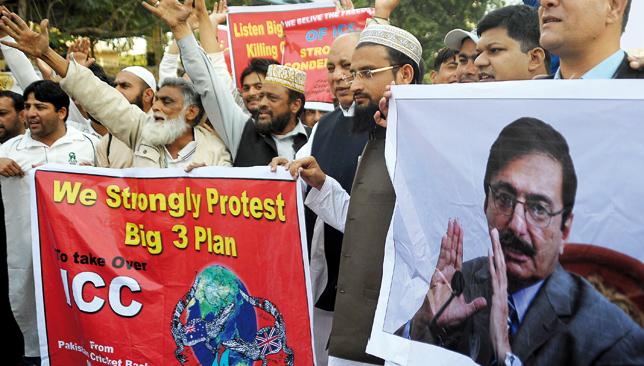
Sweeping changes to the governance of world cricket have been approved at a meeting of the International Cricket Council (ICC) board, with England, India and Australia handed the power at the head of the organisation.
The 16-man board first discussed the controversial measures, which seek to overhaul “the governance, competition and financial models” of the ICC in Dubai on January 28, but voting on proposals was deferred until Saturday’s follow-up meeting in Singapore.
The recommendations, which began life in a widely-leaked ‘position paper’ drafted by the so-called ‘big three’, were then passed with the required majority.
Cricket South Africa and the Bangladesh Cricket Board had gone public with reservations about the changes, but in the end only representatives from Pakistan and Sri Lanka chose to abstain as the remaining eight full members voted in favour.
The Board of Control for Cricket in India (BCCI), England and Wales Cricket Board (ECB) and Cricket Australia (CA) have been guaranteed three of the five seats on a new executive committee that will carry considerable influence, and three of the five on a revamped financial sub-committee.
The sense of an executive stranglehold by the boards who helped author these changes is emphasised by the fact that BCCI president N Srinivasan will become the new chair of the ICC board, with CA’s Wally Edwards chairing the ExCo and ECB chairman Giles Clarke continuing to do so for the financial committee.
Fans in Pakistan and Bangladesh had already made their views clear by staging many protests across their countries. One of those in Dhaka attracted a 3,000-strong crowd, such has been the anger over the revamp.
The changes are not abstract ones affecting various committees, though, with changes to the current financial model forming a central plank of the proposals.
India, in particular, are understood to have been unhappy that their position as the most commercially attractive force in world cricket was not being recognised in revenues from global events.
In line with that the ICC board has agreed that full members will receive a greater share of central funds based largely on their own financial contribution, but also considering “their ICC history and their on-field performances”.
The ICC is keen to assert that no full member will be worse off than they are at present but, with broadcasting and sponsorship deals set to rise exponentially, the richest nations can expect to become disproportionately wealthier.
While this may appear to leave those at the lower end of the spectrum at a disadvantage, India’s willingness to negotiate hard could have been the decisive factor. On their part, the BCCI has welcomed the ICC Board’s approval of the new governance, financial and competition structures.
“After rounds of discussions over the last three weeks, the proposals were approved without any objection. Two members abstained from voting since they felt it wouldn’t be prudent for them to take a call without the go-ahead of their respective boards,” BCCI secretary Sanjay Patel was quoted as saying by ESPNcricinfo.
“Now that the resolutions are passed, we can move on and the Chief Executives’ Committee and ICC Board can continue to work on strengthening the structure of cricket.”